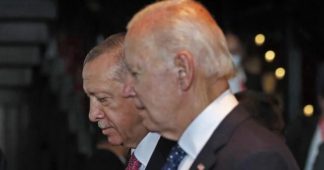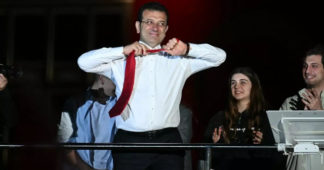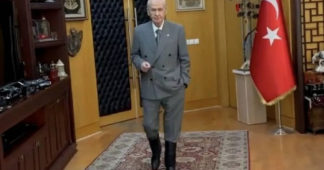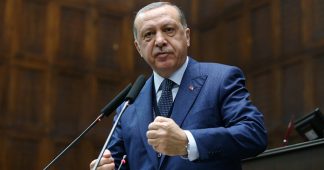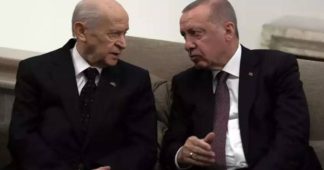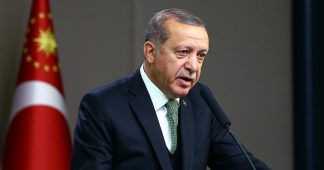by Dimitris Georgopoulos
High prices are reaping the incomes of Turkish citizens, especially in the big cities, causing explosive discontent, which was also reflected in the recent elections, Imamoglu is increasing his daily appearances in the media as a “statesman” and serious frictions have appeared in the four-party ruling coalition in Turkey itself, which includes, in addition to Erdogan’s Islamist AKP, the far-right nationalist party of Bahҫeli, the Islamist party of the former prime minister’s son and historical leader of Turkish Islamism Erbakan and a local far-right party active in central Anatolia. At the same time, serious uncertainties seem to have appeared in the Turkish President’s relations with both the Americans and the Russians. Rumours published by the Turkish press suggest that his visit to the White House has been cancelled, while Putin’s constantly announced and never realized visit to Ankara seems to be off the table.
Of course, Erdogan is a masterful tactician who has deftly avoided many risky scenarios. But diplomatic sources in Ankara believe that this time things are different and Erdogan’s government may be heading towards a potential loss of power. All the more so since the current crisis is taking place against a background of a dramatic decline in the purchasing power of the popular and even the middle classes, due to the harsh monetarist and neoliberal austerity policies pursued by the Turkish President, which are directly responsible for the recent electoral debacle, and the increasingly difficult to overcome contradictions in foreign and economic policy. Anyone who treads in two boats risks falling overboard!
In the case of the small Islamist party, the discontent started with the absence of invitation to the reception hosted by the AKP for the members of the ruling coalition. The reception itself is insignificant, an event of protocol, but not inviting a ruling coalition party is noteworthy. “We thought we were part of the coalition,” the Islamist party said. The Erdogan side probably did not invite them because of the intense criticism it faced during the election campaign, when it was accused of not supporting the heroically fighting Hamas Palestinians as it should and continuing trade relations, especially the supply of oil to Israel. Much of Turkish public opinion is completely outraged by the genocide in Palestine and Erdogan himself has not convinced that he is helping its victims as much as he can by limiting himself to strong rhetoric and supporting South Africa before the International Court of Justice, without cutting off economic relations with Israel. The Turkish president’s recent meeting with Hamas leader Ismail Haniya was an attempt to reduce the impact of criticism at home over the Palestinian issue.
But the manifestation of the resentment of the Islamists of Erbakan is not the end of the story. Bahçeli himself attacked the extreme neoliberal finance minister appointed by Erdogan, who, in a speech in Washington, said that he would continue his policy, but that to continue it he would have to convince the “locals” (lokals, i.e. the Turks!). Typically, the Turkish neoliberal’s loyalty lies with big international Capital and America, whose interests he represents in his country. Erdogan appointed him to appease big Capital and America and secure funds, risking his own position in the process. It is certainly very dangerous to be an enemy of America. The only thing more dangerous is to be its friend! (This has been found true by many in Greek history, such as Ioannidis fifty years ago. The latest case is the Tsipras – Varoufakis duo, who believed in American (Summers) and French-Jewish (Lazard) advice and promises. They went to the USA, which imposed the first and second Memorandum together with the EU through the IMF, and to the bank that created it, to help them get rid of it! (If the blind lead the blind, both shall fall into the ditch, as the Evangelist says, Matthew 15,14).
This expression (locals), used by the finance minister, provoked the indignation of Bahçeli who stressed in his statements that this way of talking is at the core of all scandals.
Bahceli to Erdogan: I cannot bear you anymore
But Erdogan’s openings to the West are not limited to the economy. Houriet’s strongly pro-American commentator Abdulkadir Selvi wrote that it is time to release Osman Kavala and Selahattin Demirtaş because their detention is no longer useful. This, of course, is infuriating Bahçeli, who has long been calling for a complete ban on the pro-Kurdish party and even for its members to be stripped of their Turkish citizenship.
A senior Bahçeli official strongly criticized the Hurriyet journalist, who then appeared to sit next to Erdogan on the plane during the trip to Iraq. Bahçeli retorted by uploading a video of him singing a well-known and very sad oriental song, the lyrics of which say, among many other things: “… Always with chains like a slave, I became your friend, you became my enemy…
… If I say ‘you are a traitor’, you are the one who made me say it
Don’t be angry at my words. If I blame you, you’re the one who made me blame… I cannot bear you anymore…
… You didn’t appreciate me when I said ‘you’re my love, you didn’t appreciate what you had.”
Bahçeli, it should be noted, is the man famous as the “canary in the coal mine”. He warns and causes major changes, as when he brought down the previous government and brought Erdogan to power or when he announced the new Turkish constitution.
Erdogan himself in the meantime has become increasingly polite to the Kemalists, perhaps toying with the idea of a rapprochement with them on certain issues, such as a new more leftist and popular constitution, changing the criteria of nationality and rendering local authorities more independent for example.
Towards increased Turkish aggression and US-German pressure on Greece
Of course, we cannot make safe predictions about where Turkey is going; what is rather certain is that any shift of the Turkish political axis towards the Kemalists and the West will probably mean increased aggression towards Greece, but also stronger Atlantic pressure on Athens to make sovereignty concessions in the Aegean, Thrace and Cyprus, in order to better “integrate” Turkey into the alliance.
The view proclaimed by Greek politicians that they want Turkey to come closer to NATO is unrealistic and dangerous. The most serious problems between Greece and Turkey (displacement of Greeks of Turkey, threats and invasion of Cyprus) occurred when both countries were loyal instruments of the Atlantic Alliance. Turkish aggression for half a century against Greece and Cyprus after 1955 was fuelled by the “collective West” (USA, Britain, Israel) to void the Cypriots’ right to self-determination and Greece’s right to independence.
On the contrary, Erdogan kept the Turkish claims in abeyance for more than 15 years, until the wisecracks and provocations, dictated by the well-known lobby (East-Med, triangular alleged alliances, nonsense about alleged preventive wars and the like) came along to awaken Turkish nationalism and chauvinism and bring us to the situation we are in now.
Mitsotakis and armaments
Athens’ policy towards Turkey so far is completely incoherent and dictated. On the one hand, we risk war with Turkey over the EEZ of the Eastern Mediterranean, and on the other hand, we simultaneously cede it to Ankara through the Dendias agreement with Egypt. On the one hand we campaign to prevent Erdogan from getting F16s, on the other hand we sign friendship agreements to help him get them! We place colossal orders for new weapons that we cannot afford, but we send existing weapons to Ukraine.
What Mr Mitsotakis should do now, but probably neither can, nor wants to, nor is allowed to, nor knows how to do it, is to negotiate an arms control agreement with Turkey, rooted in the principles of the US-Soviet arms control agreements. Erdogan had proposed this to George Papandreou in 2010, but the then Prime Minister, who every now and then referred to peace, did not even discuss the idea, as he did not dare to take the slightest step outside the stifling framework of US-dictated policy.
The terrible weapons that we and the Turks are now buying, if used will destroy us, and if not used will finish off what remains of our economy.
We remind our readers that publication of articles on our site does not mean that we agree with what is written. Our policy is to publish anything which we consider of interest, so as to assist our readers in forming their opinions. Sometimes we even publish articles with which we totally disagree, since we believe it is important for our readers to be informed on as wide a spectrum of views as possible.
